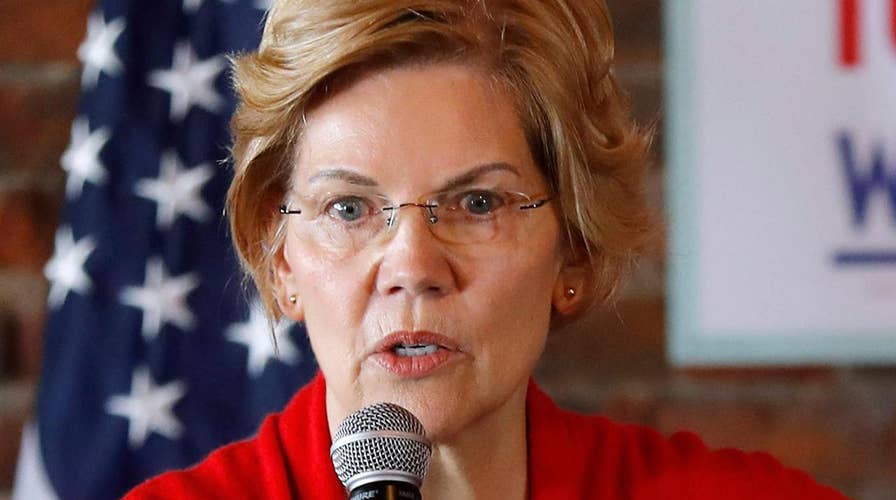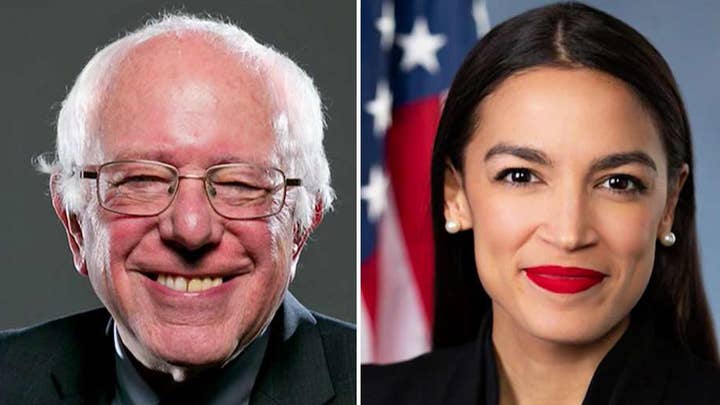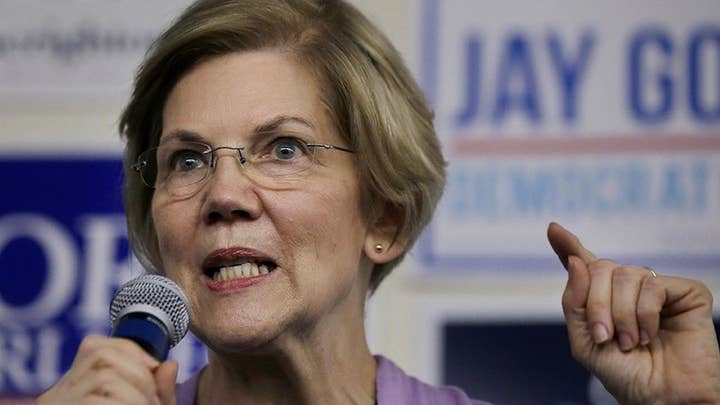Sen. Elizabeth Warren touts $1.25 trillion plan to forgive student loan debt, provide 'free' college
Can America afford the 2020 presidential hopeful's ambitious plan? King's College business and economics professor Brian Brenberg weighs in.
As Sen. Elizabeth Warren climbs in Democratic presidential polls, touting an image as the champion of the working class against powerful corporations, it's only a matter of time before she faces renewed questions about her history advocating on behalf of the kinds of corporations she now vilifies.
That work predated her time in the Senate. She helped LTV Steel in its effort to dodge paying employee benefits in 1995; helped defend the Travelers Insurance company in a 2009 Supreme Court case against consumer asbestos claims and did bankruptcy consulting work for Dow Chemical after a lawsuit by thousands of women with allegedly faulty breast implants that caused health problems.
WARREN URGES REDUCING DEFENSE CONTRACTOR INFLUENCE AT PENTAGON
On the campaign trail, that history is not part of the personal narrative.
“I’ve spent my career getting to the bottom of why America’s promise works for some families, but others who work just as hard slip through the cracks into disaster,” the second-term Massachusetts Democrat said in her original campaign video announcing her exploratory committee. “What I found is terrifying. These aren’t cracks that families are falling into. They’re traps. America’s middle class is under attack. How did we get here? Billionaires and big corporations decided they wanted more of the pie and they enlisted politicians to cut them a fatter slice.”
Some of that career was reportedly spent earning as much $675 per hour as a corporate lawyer, a side job while working fulltime in academia. Her vanquished 2012 opponent Sen. Scott Brown, a Republican, failed to make the corporate-past issue stick. However, she faces a different set of circumstances in the 2020 Democratic primary field, as she tries to lure away progressive support from Sen. Bernie Sanders, I-Vt.
A recent Fox News poll showed Warren moving into third place in the crowded Democratic field, with 9 percent of the vote. Rep. Alexandria Ocasio-Cortez, D-N.Y., a favorite among the party’s far-left base, indicated she would likely endorse either Sanders or Warren.
“Warren’s half-baked rhetoric belies her record. From falsely claiming minority status to advance her career to her long record of fighting on behalf of corporate interests, to hear Warren now say she will fight for the little guy is ridiculous,” Steve Guest, a spokesman for the Republican National Committee, told Fox News.
Fox News contacted Warren’s presidential campaign and Senate office but got no formal response, aside from a campaign email acknowledging the inquiry and stating “someone from the press office will be in touch.”
Today, insurance companies are often one of Warren’s biggest rhetorical targets. In the campaign video, Warren quipped, “Politicians look the other way while big insurance companies deny patients lifesaving coverage.”
Travelers, however, paid Warren $212,000 over three years in consulting fees, in the case of Travelers v. Pearlie Bailey that went to the U.S. Supreme Court, the Boston Globe reported.
In 1982, Johns Manville, a large asbestos maker, filed for bankruptcy because of multiple asbestos liability claims, and entered into a settlement with cancer victims. But, by 2001, the company fund began to slash payments to those in the settlement, and plaintiffs filed suit against Travelers in state courts accusing the company of breaking consumer protection, alleging it hid dangers of asbestos.
The high court ruled in favor of Travelers in June 2009, largely shielding the company from future lawsuits. The Boston Globe reported, “Travelers won most of what it wanted from the Supreme Court, and in doing so Warren helped preserve an element of bankruptcy law that ensured that victims of large-scale corporate malfeasance would have a better chance of getting compensated, even when the responsible companies go bankrupt.”
Gayla Benefield, an asbestos victim and victims’ advocate, was quoted in a 2011 Boston Herald article saying of Warren, “She’s supposed to be a consumer advocate? That’s laughable. … I guess she’s just doing her job, but I don’t think she would get the vote of anybody who’s an asbestos victim.”
LTV Steel reportedly paid Warren $10,000 to write its Supreme Court petition in 1995 to attempt to help the firm avoid paying into a fund that gave health benefits to retired coal miners. This put her on the opposite side at the time of the Clinton administration and the United Mine Workers. However, the Supreme Court ultimately didn’t take the case.
ELIZABETH WARREN'S OFFER TO HELP COMEDIAN 'FIGURE OUT' LOVE LIFE SENDS TWITTER INTO FRENZY
The 1992 Coal Industry Retiree Health Benefit Act required about 100 former mining companies to continue to pay the benefits for retired miners that earned them. LTV was in bankruptcy when the law took effect in 1993. Warren argued the company’s obligations should have been addressed as part of the bankruptcy.
When the case came up during the 2012 Senate campaign, Warren campaign spokeswoman Althea Harney said: “In the LTV steel case, there was never any question that coal miners and their surviving spouses would receive their full benefits under the Coal Act. This case involved bankruptcy principles and who would pay what into the fund.”
After the Supreme Court didn’t accept the case, LTV reportedly had to pay about $140 million in benefits to retired miners.
Warren stated in a 2002 affidavit that she worked for Dow Chemical, the parent company of Dow Corning, which went into bankruptcy in 1995 after lawsuits over allegedly faulty breast implants. Some of the claims reportedly stated the implants caused autoimmune diseases and made it difficult to diagnose cancer. When Dow Chemical employed Warren, it was reportedly trying to limit its liability by asserting it was a separate company from Dow Corning. The company initially made a $3.2 billion settlement with about 170,000 women, but many reportedly got only a minimal payment.
Warren, when pressed on the matter during her 2012 Senate run, declined to provide details about her work with Dow. However, her campaign argued that establishing a trust fund would have been the only means to ensure victims were compensated.
The Springfield Republican newspaper in 2012 quoted Brown's campaign manager saying: “Dow did not hire Elizabeth Warren in order to further to serve the interests of the victims. That’s not what these companies do, not why they pay big money to high profile lawyers.”







